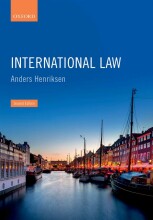Summary: International Law | 9780198828723 | Anders Henriksen
- This + 400k other summaries
- A unique study and practice tool
- Never study anything twice again
- Get the grades you hope for
- 100% sure, 100% understanding
Read the summary and the most important questions on International Law | 9780198828723 | Anders Henriksen
-
1 Foundations and structure of international law
-
1.1 An introduction
This is a preview. There are 3 more flashcards available for chapter 1.1
Show more cards here -
What kind of relationships are dealt with in the international law system?
Primary just interrelationships between souvereign states but secundary also international organizations or individuals who posses rights or obligations under international law. -
What is the consequence of the seemingly ever-expanding reach of international law?
The gradual development of thousands of sub-disciplines such as international human rights law, environmental law etc. -
What kind of changes have been made in the international law system compared to the old days?
In the last couple of years our international law system has formed multiple 'sub-disceplines' such as environmental law, human rights etc. These sub-disceplines sometimes overlay eachother, for example the Covid-19 pandemic. -
What are the main differences between domestic and international law?
In international law, there is neither a legislative nor an executive branch and there is no mandatory and well-established procedure for the settlement of legal disputes -
1.2 A brief history of international law
This is a preview. There are 1 more flashcards available for chapter 1.2
Show more cards here -
What was the Kellog Briand pact?
1928 , decision torefrain from war as a method for dispute settlement. -
What was the influence of the cold war on international law?
It marred the activities of the UN, until the collapse of communism. In Kuweit 1991 UN acted. -
What entails the Bretton Woods system?
Conference 1944 at Bretton Woods that created the most important international organistations for regulation of trade and monetry policy:IMF , GATT/WTO, World Bank -
What is consensual theory?
Positivism. Unless a state has consented to be bound by a rule, no international legalobligation exists and the state remains entitled to act as itpleases . -
1.2.1 Early modern international law
This is a preview. There are 4 more flashcards available for chapter 1.2.1
Show more cards here -
What is natural law (jus naturale)?
Natural law contained an all-embracing set of ideas about natural and social life in the universe and, though it primary focused on the individuals and their relations to the world, it also applied to states by virtue to the fact that rules were also individuals and therefore subject to it. -
1.2.2 Peace of Westphalia
This is a preview. There are 4 more flashcards available for chapter 1.2.2
Show more cards here -
Why can the Peace of Westphalia (1648) that brought an end to the Thirty Years War that had ravaged continental Europe be seen as the birth of international law?
Because the Peace/Treaties of Munster/Osnabruck had the idea to reduce the powers of transnational forces, like empire and religion and instead compartmentalize territory and individuals into sovereign states.
- Higher grades + faster learning
- Never study anything twice
- 100% sure, 100% understanding
Topics related to Summary: International Law
-
Foundations and structure of international law - A brief history of international law
-
Foundations and structure of international law - The structures of international law
-
Foundations and structure of international law - The relationship between international and national law
-
Sources of international law - Introduction
-
Sources of international law - Conventions (treaties) as a legal source
-
Sources of international law - Custom as a source of international law
-
Sources of international law - General principles as a source of law
-
The law of treaties - The treaty as a concept under international law
-
The law of treaties - Consent to be bound
-
The law of treaties - Reservations
-
The actors in the international legal system - The state
-
Jurisdiction - Jurisdiction to prescribe - Introduction
-
Immunity from national jurisdiction and diplomatic protection - State immunity
-
Immunity from national jurisdiction and diplomatic protection - The immunities of state representatives
-
State responsibility - Circumstances precluding wrongfulness
-
International human rights law
-
The peaceful settlements of disputes - Non-adjudicatory means of settling international disputes
-
The peaceful settlements of disputes - The International Court of Justice
-
The international regulation of the use of force

































